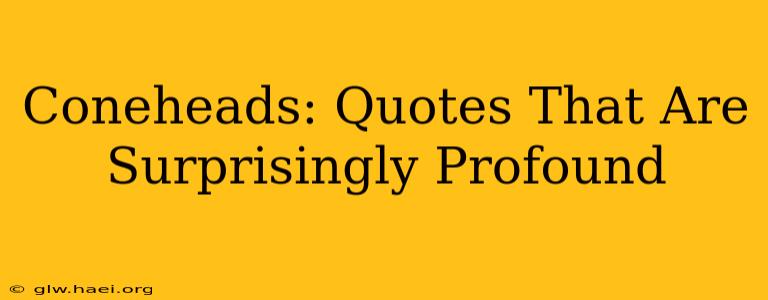The 1993 comedy Coneheads might seem like just another silly movie about alien shenanigans, but beneath the goofy premise and outlandish characters lies a surprising depth. Many of the film's quotes, initially delivered for comedic effect, resonate with a surprising level of profundity when examined closely. They offer unexpected insights into family, assimilation, and the search for belonging – themes that transcend the movie's comedic surface. Let's delve into some of these surprisingly insightful lines and explore their hidden meanings.
"We are Coneheads. We come in peace."
This iconic line, uttered countless times throughout the film, is more than just a simple introduction. It's a statement of identity, a declaration of peaceful intentions, and a surprisingly vulnerable act of self-revelation in a world that initially fears and misunderstands them. The simplicity of the phrase belies the complexity of their situation: they are different, yet they wish for acceptance. It's a universal human experience – the desire to be understood and appreciated for who we are, despite our differences.
"My brain hurts."
This seemingly simple phrase, often uttered by teenage Connie, speaks volumes about the challenges of adapting to a new culture and navigating the complexities of adolescence. Her "brain hurt" isn't just a physical ailment; it's a metaphor for the cognitive dissonance and emotional turmoil of trying to reconcile two vastly different worlds. It's a relatable sentiment for anyone who's ever felt overwhelmed by the pressures of change and the struggle to fit in.
"We will not be assimilated!"
This rallying cry, a defiant rejection of conformity, speaks to a deeper human need for self-preservation and the preservation of cultural identity. While delivered with a comedic flair, the sentiment itself is powerful and relevant today. It speaks to the importance of resisting pressures to abandon our individuality in the face of societal expectations.
What are the Coneheads' names?
The Coneheads' names are a key part of their identity, highlighting their alien origins while also attempting to blend into human society. Beldar and Prymaat Conehead, along with their daughter Connie, use names that are both recognizable yet subtly unusual, echoing the struggle to navigate the balance between assimilation and self-expression. This naming convention adds to the film's commentary on immigration and cultural identity.
Are the Coneheads good or bad?
The Coneheads are ultimately portrayed as well-meaning, if somewhat clumsy, aliens. Their intentions are always peaceful, even if their methods are often unconventional. Their journey is one of learning and adaptation, showcasing the inherent goodness in their hearts despite their otherworldly origins. This underscores the film's message that appearances can be deceiving and that judging others based on superficial differences can be detrimental.
What is the meaning behind the Coneheads' appearance?
Their cone-shaped heads are a visual representation of their otherness, serving as a constant reminder of their alien heritage. However, the movie uses humor to downplay the potentially threatening nature of their physical difference, emphasizing their humanity and relatable struggles. The unique appearance forces the audience to confront preconceived notions and challenge biases, leading to a deeper understanding of the characters' experiences.
The Lasting Legacy of Coneheads
While Coneheads is undeniably a comedy, its enduring popularity stems from its surprisingly insightful portrayal of family, identity, and the universal human experience of navigating a complex world. The seemingly simple quotes, revisited years later, offer a surprisingly profound commentary on cultural assimilation, the struggle for acceptance, and the enduring power of family bonds. It’s a testament to the film’s clever writing and the lasting impact of its humorous yet poignant message.

